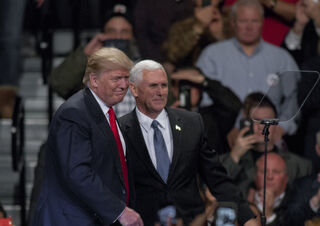President Donald Trump
Why Did 74 Million People Vote for Trump?
A Reflection on Fred Siegel.
Posted December 14, 2020 Reviewed by Lybi Ma

Trump continues to contest the election, but it appears American democracy has survived. Biden won the popular vote by 7 million (81 million to Trump’s 74 million). Yet we are left with the reality that nearly half of voting Americans backed Trump. In my last post, I tried to explain the commitment of Trump’s diehard followers. But clearly, not all of those 74 million supporters are fanatics. I have a friend who votes strictly from his wallet, and tax breaks motivated his vote and likely millions more. But who else?
Recently the Wall Street Journal posted a story titled, “An Ex-Liberal Reluctantly Supports Trump.” The ex-liberal is Fred Siegel, an emeritus Professor of History at the Cooper Union in NYC. I worked with Fred for 10 years at the Cooper Union. It came as a big surprise to me he was an ex-liberal. I was a newbie adjunct, and he was a tenured professor. I found him intimidating. I conceived him as a “bulldog intellectual.” Smart, witty, gruff, with a good sense of humor. I chided him that his lunch of Fritos and a can of Coke was a recipe for disaster. I also knew him as a big supporter of Mayor Rudolph Giuliani.
I have two clear remembrances of Fred. When President Clinton spoke at the Cooper Union in 1993, Fred rushed to the stage as the speech ended to shake his hand. I thought it was odd given his political positions. But apparently, he voted for Clinton. A few years later the only time I publicly disagreed with him was over Clinton’s impeachment. He was for it, I wasn’t.
My second memory is of the revisions the faculty made to the Western Civilization program under the direction of Andy Rabinbach. I was Andy’s graduate student, and with his guidance took the lead. At the time we were using Eugen Weber’s Western Civilization, which had become dated with the popularity of post-modernism. In response, we put the rise of Western Civilization in a global context, adding readings by Las Casas, Gandhi, Sartre, etc. Fred wasn’t happy about the changes and let me know it. When the new reader was a success – especially with the students – Andy said to Fred “You owe Tim an apology.” He chortled and didn’t apologize.
As a scholar, Fred has been prolific. His 1993 book, The Future Once Happened Here: The Fate of American Big Cities, blamed the radicalism of the 1960s for the decline of New York, Los Angeles, and Washington. I was enthralled with New York City, so it didn’t resonate with me. It did, however, resonate with Mayor Giuliani, whom Fred advised. Giuliani brought real change to the city. He locked up the squeegee guys who fell upon cars as they came out of the Lincoln Tunnel. He also converted city buses to natural gas from diesel. Giuliani also continued the policies of removing the homeless from the streets with the help of Police Commissioner William Bratton and his theory of no broken windows. When I was called up for jury duty, I discovered they were railroading young kids for selling crack cocaine to Rikers Island for three years. I refused to participate but in hindsight, I should have stayed and “hung” the jury. Giuliani subsequently wrought many changes, and I am sure Fred was satisfied with his influence.
In 2014 Fred published his second major work, The Revolt of the Masses: How Liberalism Undermines the Middle Class. According to Fred, the liberal elite actually disdains the middle class; he traces this contempt back to the 1920s, with writings of Sinclair Lewis, H. G. Wells, and H.L. Mencken. Noah Milman in The New York Times claimed that the book was “an attempt not to educate but to stoke the resentments of conservative readers.” In much the same way that his first book provided a blueprint for Giuliani, this one has presaged Trump’s form of divisive politics.
Fred gives three reasons for his support of Trump. First, foreign policy: “Crushing ISIS, pulling us out of the Iran nuclear deal, moving our embassy to Jerusalem, and making fools of those people who insist that the Palestinian issue is at the heart of the Arab-Israeli conflict.” Second, for Trump’s “ability to withstand a prolonged coup attempt by the Democrats and the media.” Fred admires Trump’s ability to survive and his “extraordinary amount of arrogance, egotism, and self-confidence.” Finally, Fred views Trump as a champion of the middle class and the bourgeois values that he claims are under a threat from the intellectual elite and their propagation of political correctness or “wokeism.”
I am no specialist, but it seems the Israeli-Palestinian conflict still exists as a key bone of contention. To the degree there has been a rapprochement between the Israelis and Arabs, it stems more from the threat of Iran, and that rapprochement has come at the expense of the Palestinians.
Be that as it may. Fred’s admiration of Trump’s ability to withstand “a prolonged coup attempt” is just confusing, especially since the article begins with the recognition that Trump ripped off a quarter-million dollars from a good friend. Is the tool of litigation to be exploited only by Trump? Also, we still don’t know the full extent of the relationship between the Russians and the Trumps, history will be the final arbiter.
Given Fred’s “bulldog” character and his attack on “wokeism,” I can imagine the smile on his face and the pleasure he takes in being the disrupter. In this sense, Fred is just like Trump’s more ardent followers. He feels good venting his disdain for the intellectual elites and promoting middle-class values against wokeism.
And with a blast of remarkable irony, Fred holds Obama to blame for the current racial divide in the country, claiming “the worst thing” was Obama’s “effect on race relations. We wouldn’t have the cold civil war we have now without Obama because he, in a very cunning way, exacerbated all of our racial tensions.” Under Obama, according to Fred, “racial grievance” had “new legitimacy, and it came from the president talking in asides, and saying things between the lines.”
Can one imagine Trump holding a “Beer Summit” to ease the tension between a wrongly arrested black college professor and a white police officer? No. But can you imagine Trump promoting a birther movement questioning Obama’s citizenship? You can, because he did. And you can imagine Trump claiming there were good people on both sides in Charlottesville. The call for the Proud Boys to stand back and stand by is a clear example of aggravating racial tensions.
Fred also rightfully admires the middle-class values of “hard work, faith, family and autonomy.” He holds that the liberal elite somehow undermines these values by promoting political correctness. I live in Southern California, the land of wokeism. In my role as a purported “liberal elite” professor of mainly first-US-generation college students, I expend a great deal of effort teaching the values of diversity and tolerance. I have confronted some of the traps set by the ever-treacherous effort to define political correctness—as a white male, for example, I have been accused of misogyny based on my gender and skin color.
Accusation is an easy card to play to delegitimize a differing opinion. But I still hold that pursuing ideally all-inclusive wokeism is the best way forward for a multi-cultural diverse society. Wokeism can accommodate hard work, faith, and family—it's a broader understanding of these values.
Finally, Fred’s anti-liberal politics by default lead him to embrace Trump’s authoritarian tendencies, denigration of the press, the politicization of the courts, and attack on our democracy. Fred knows this – but allows his identification with Trump’s politics of resentment to blinker him to illiberal authoritarianism and the subsequent slow erosion of our democracy. I was surprised to learn Fred was once a liberal, and I am dismayed by his support of Trump -- further proof that Trumpism is now deeply ingrained in American culture.




